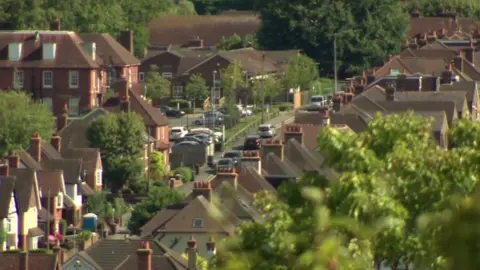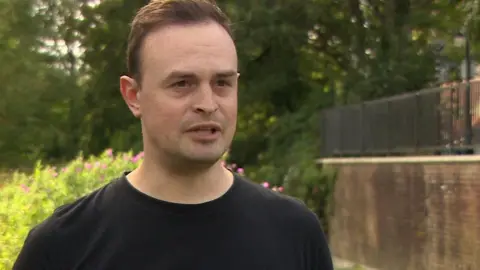Coronavirus: London's commuter towns see sharp rise in benefit claims
 BBC
BBCLondon's commuter towns have seen the highest rate of people moving onto Universal Credit since the coronavirus lockdown began, BBC research has found.
Guildford, Stevenage and Hemel Hempstead have had disproportionate rises in people claiming the benefit.
Nearly 5.5 million people are now claiming benefits across Britain - an 81% increase since March.
Experts said the drop in office-based working in the capital has impacted employment in commuter towns.
Some of those who have applied for Universal Credit were forced to do so because they did not qualify for other government support, such as the furlough scheme or help for the self-employed.
BBC analysis of official postcode data from the Department for Work and Pensions shows that Guildford in Surrey had the sharpest increase in the proportion of people moving onto the working-age benefit.
In June, there were almost 37,000 people in the town on Universal Credit - a rise of 148% since March, according to the latest figures.
Two of London's outer boroughs, Harrow and Kingston-upon-Thames, have also seen increases far in excess of the national average.
Laura Gardiner, research director at the Resolution Foundation think tank, which researches living standards of those on low-to-middle incomes, said the large numbers of workers in London who have still not returned to their offices are contributing to the demand for Universal Credit.
"Those workers may be able to continue working from home, but lots of the industries around them - the cafes, restaurants, the retail sectors - people who travel into the city to provide services to those office workers, therefore have nothing to do," she said.
"Those people tend to live on the outskirts of cities, and this is especially acute in London."

Places with the highest rate of people moving onto Universal Credit since March
- Guildford - 148%
- Harrow - 142%
- Kingston-Upon-Thames - 138%
- Hemel Hempstead - 129%
- Redhill - 128%
- Stevenage - 127%
- Luton - 126%
- Bromley - 124%
- Ilford - 120%
- North West London - 117%
Source: BBC analysis of Department for Work and Pensions data between March and June

Linford's story: 'Every job I had was cancelled'

Linford Miles, 31, is a self-employed photographer and filmmaker from Farnham, Surrey.
"I had about 20 jobs lined up, a lot of bookings in April and May," he says. "As we saw Covid sweeping across the world, I started getting more and more calls from clients saying, we don't feel it's a safe idea going ahead with these projects.
"Every single job I had was cancelled.
"I looked at the self-employment scheme, but I didn't qualify as I had only just started up within the past 12 months, so the only option was Universal Credit.
"I've always seen myself as being self-sufficient, I've always tried to keep a job. So it was pretty disheartening when I had to apply for Universal Credit.
"It definitely affected my mental health - I didn't really want to leave the house, I didn't feel much pride or self-respect. It caused a great deal of stress.
"The money from Universal Credit was nowhere near enough to cover my personal expenses - never mind my business expenses.
"I was being hounded as well by messages on the Universal Credit system to apply for work, to look for employment, to attend job fairs. Every single email that came in, every single ping, just triggered something in my mind, it just added more stress."

The volunteers of Stoke Community Support, a church-led initiative in Guildford, started cooking meals to help local families in need in April.
They initially provided frozen dishes twice a week to 45 families. They're now helping 140 households.
The increase has been driven in large part by people losing their jobs or seeing their hours cut.
"A lot of retail jobs have gone," said Peter Curran, who leads the project. "Manual workers, zero hours type contracts, in coffee shops - that's where a lot of the job losses are."
'Five-figure salary'
The Guildford area has a large number of consultancy businesses and self-employed traders, dozens of which have become insolvent in recent weeks.
Allen Ruddock, a financier turned property developer, is struggling to keep his businesses afloat. He was advised to apply for Universal Credit but he says his pride has so far stopped him from doing so.
"Guildford is a very entrepreneurial environment, and a lot of small businesses get created," he says.
"But when something like Covid hits, if you're not an established business, then you are going to have to seek support elsewhere.
"I've gone from a five-figure salary to scraping to get by on a few thousand and that's why Universal Credit might end up being my sole option in the end."
